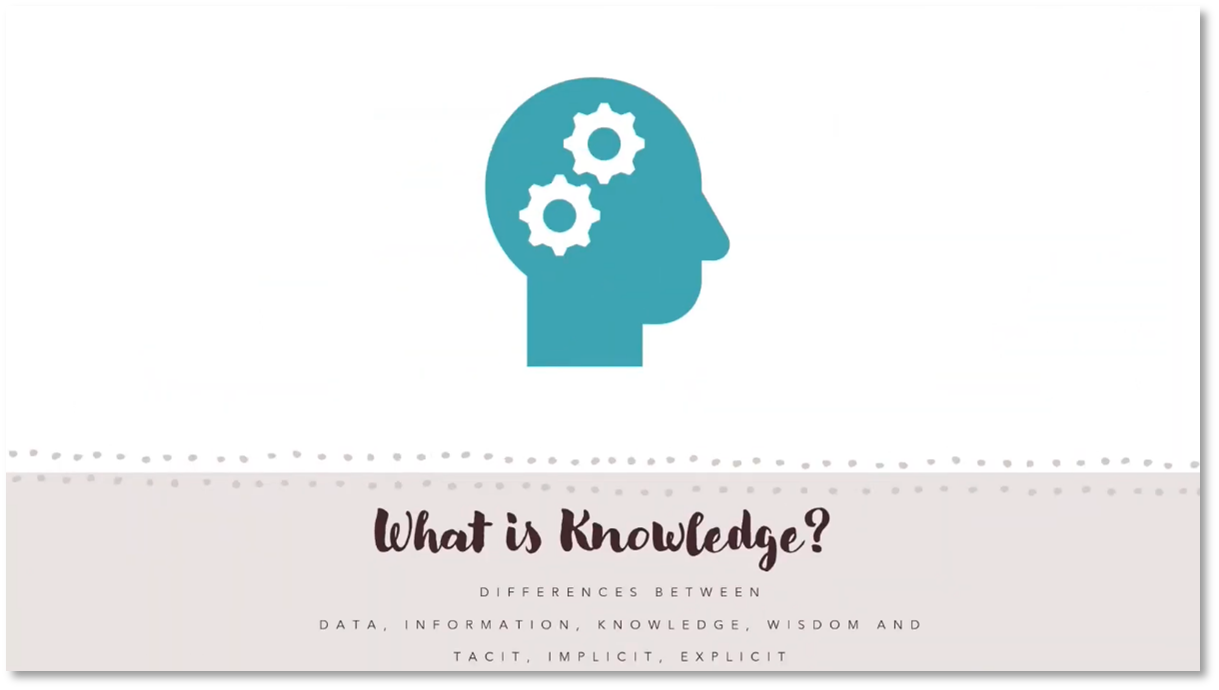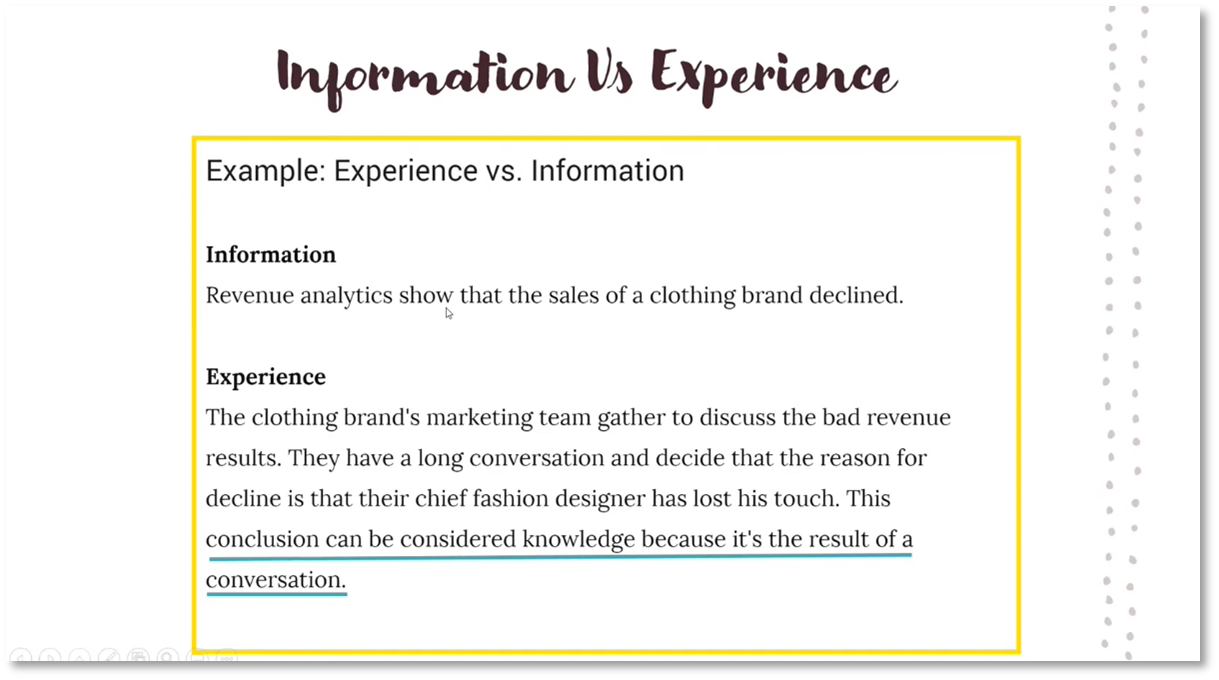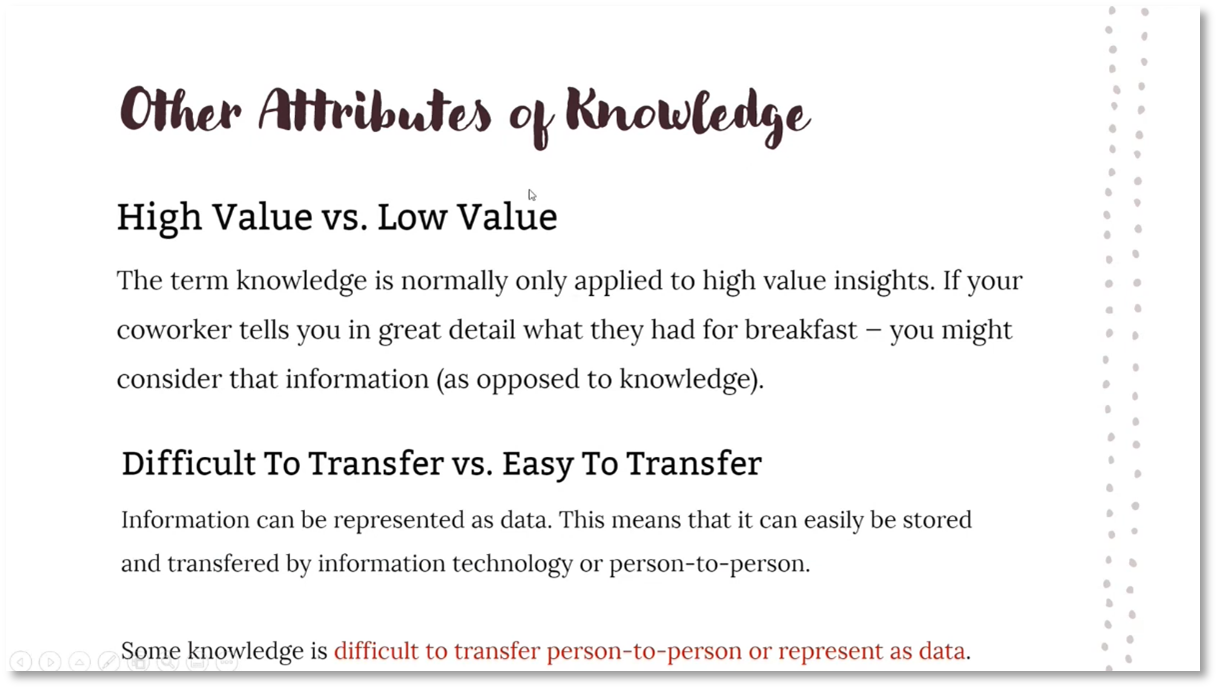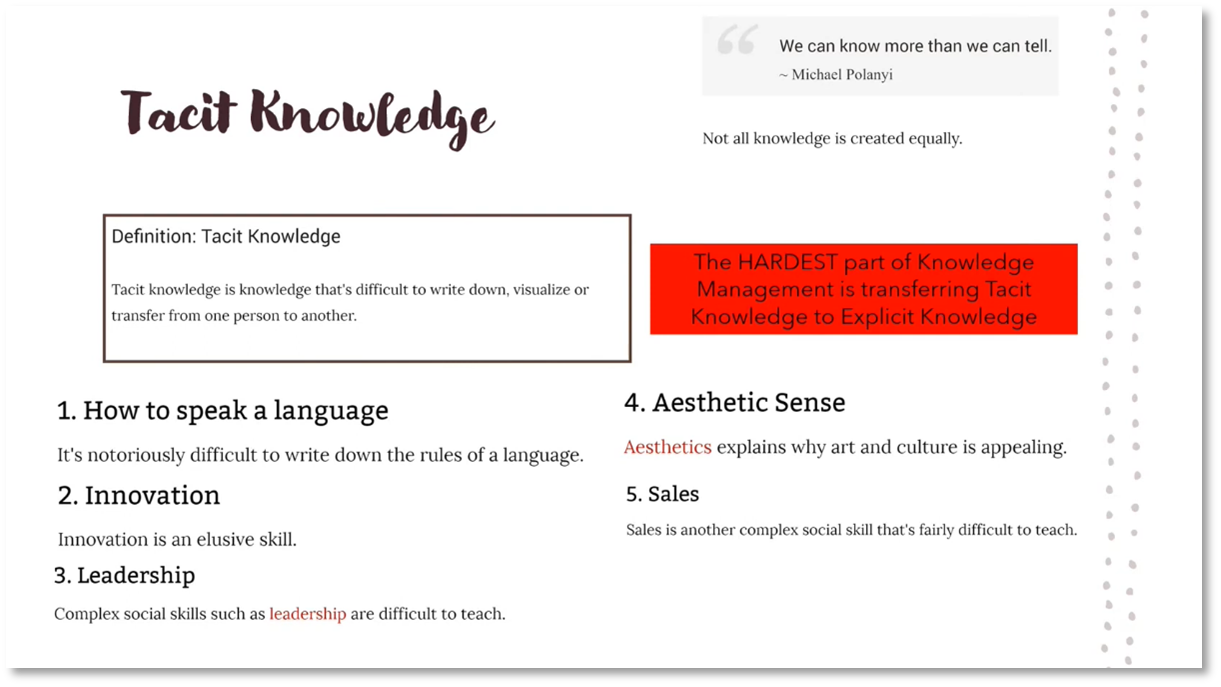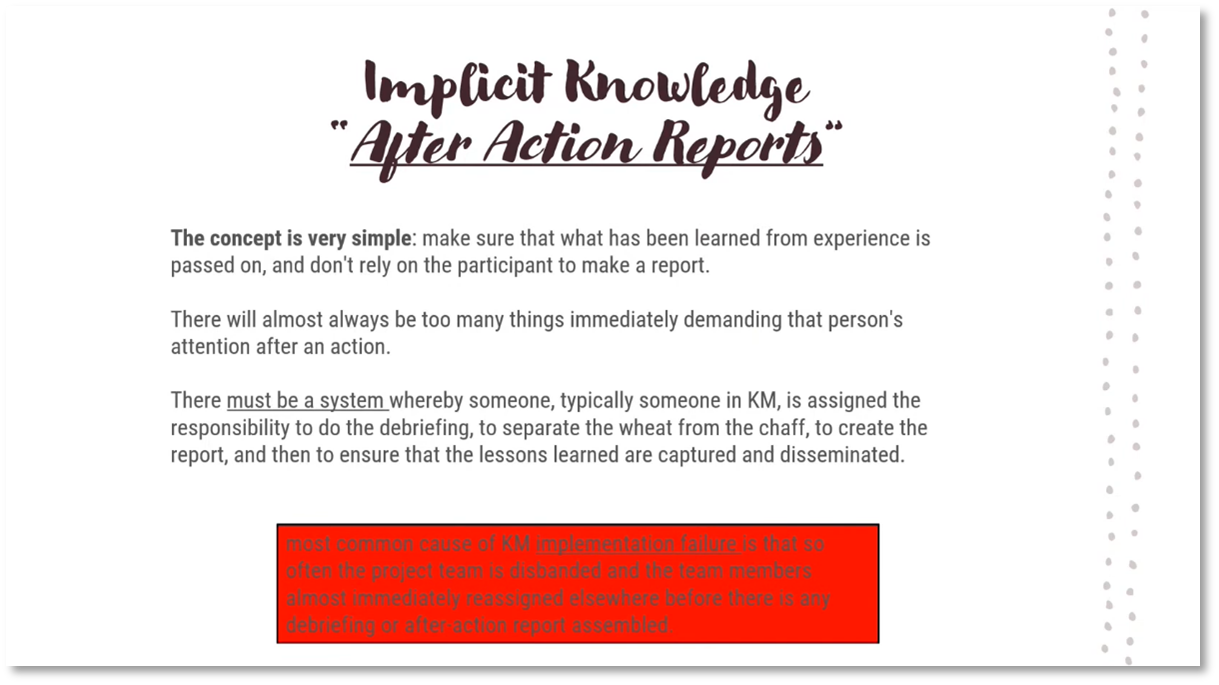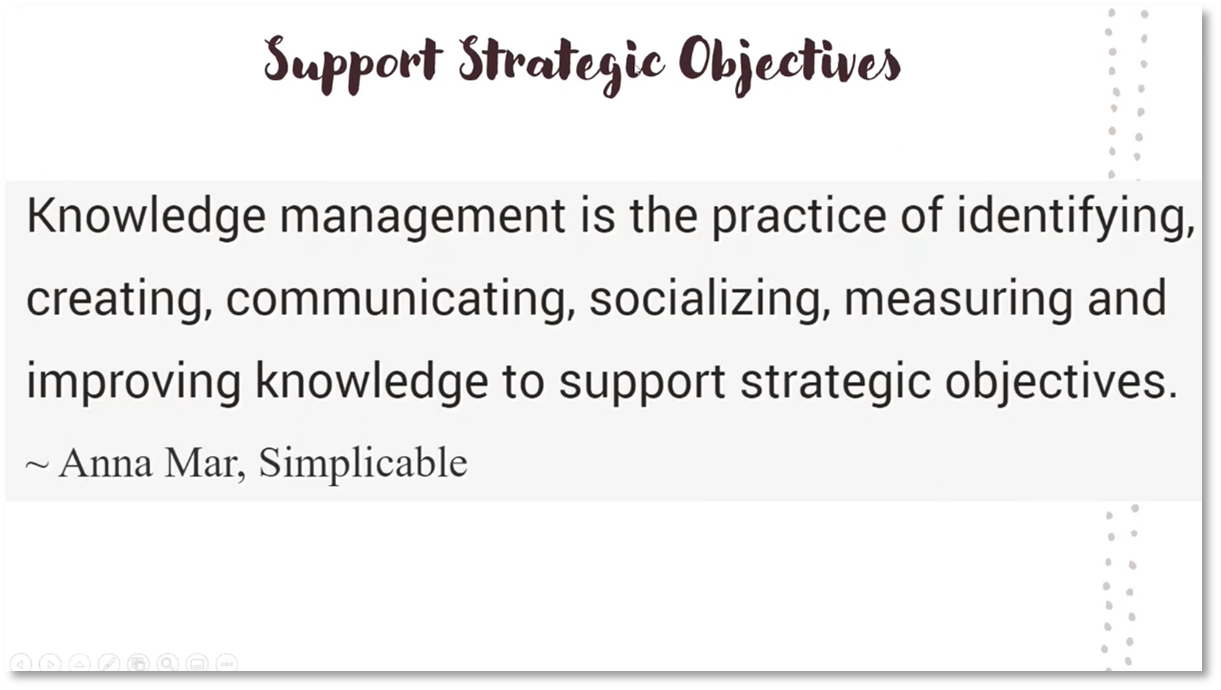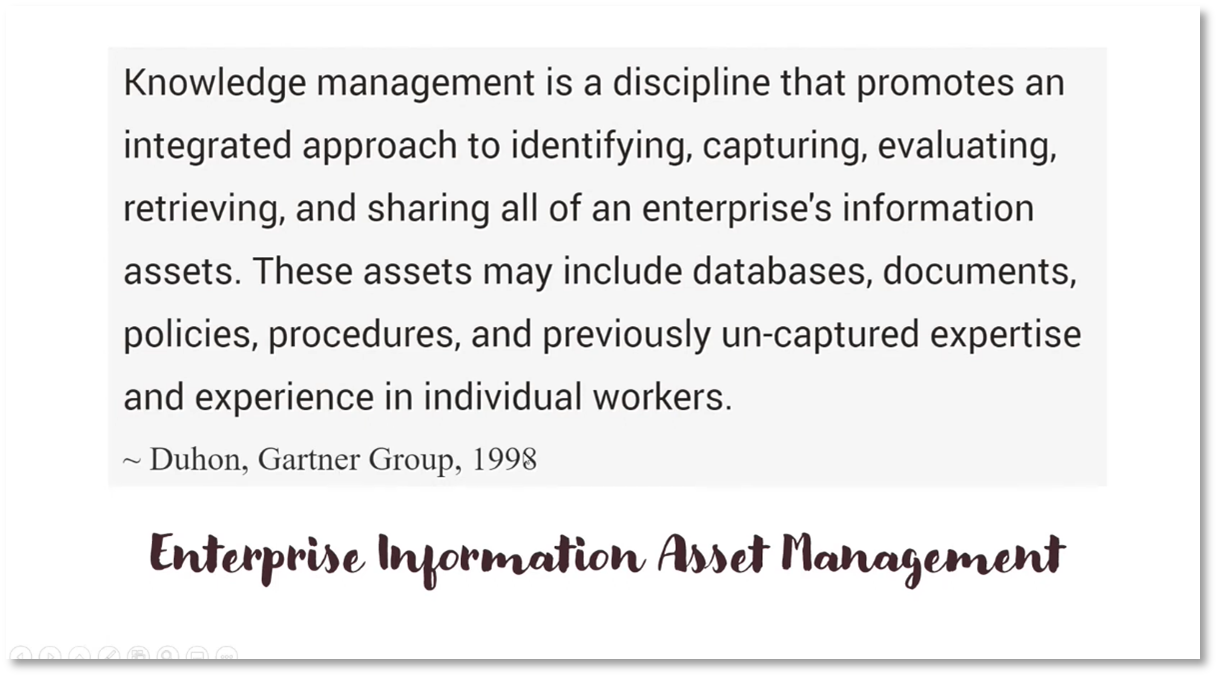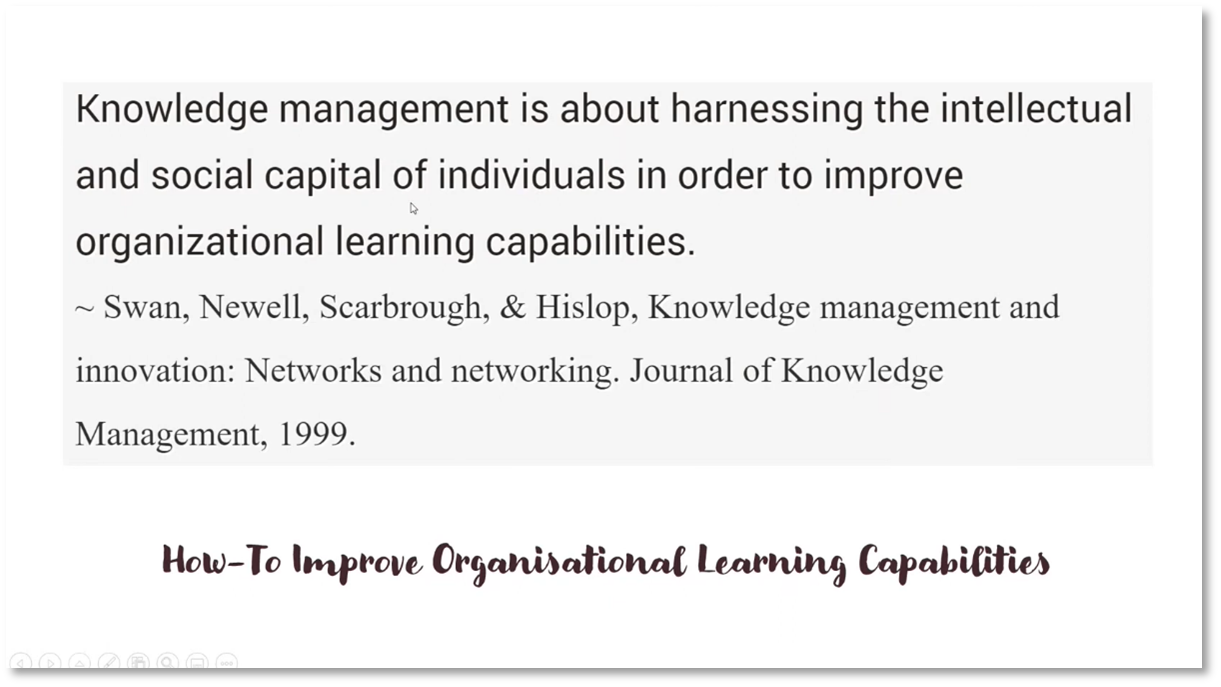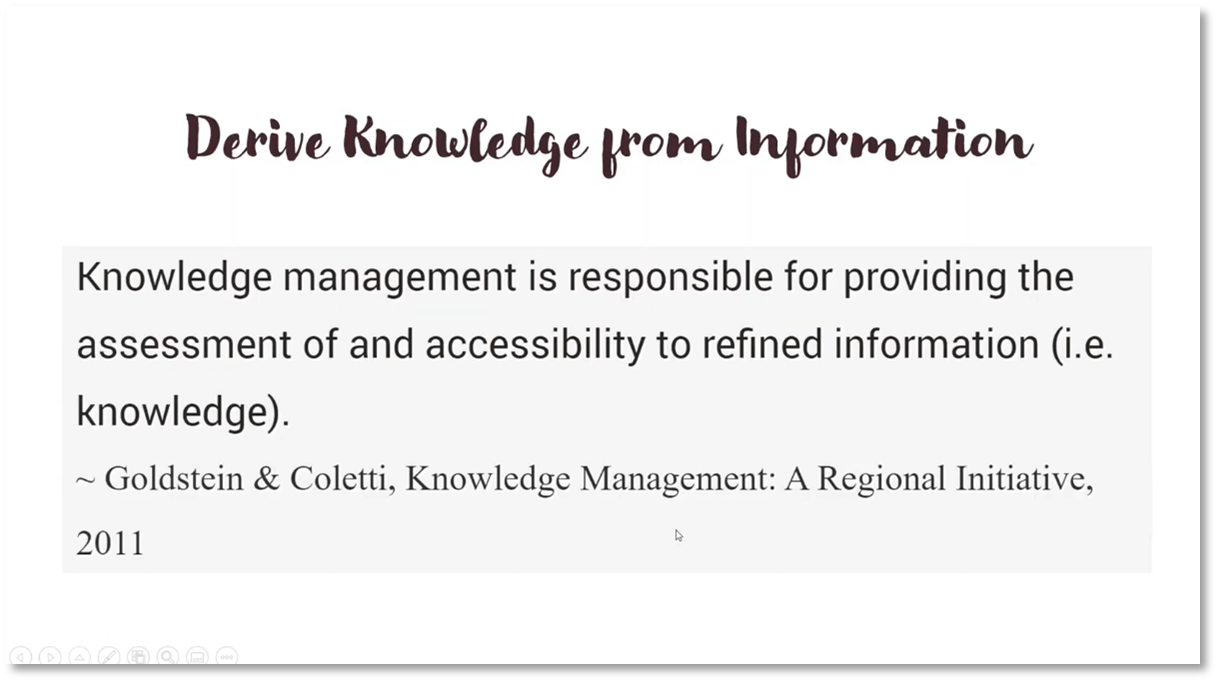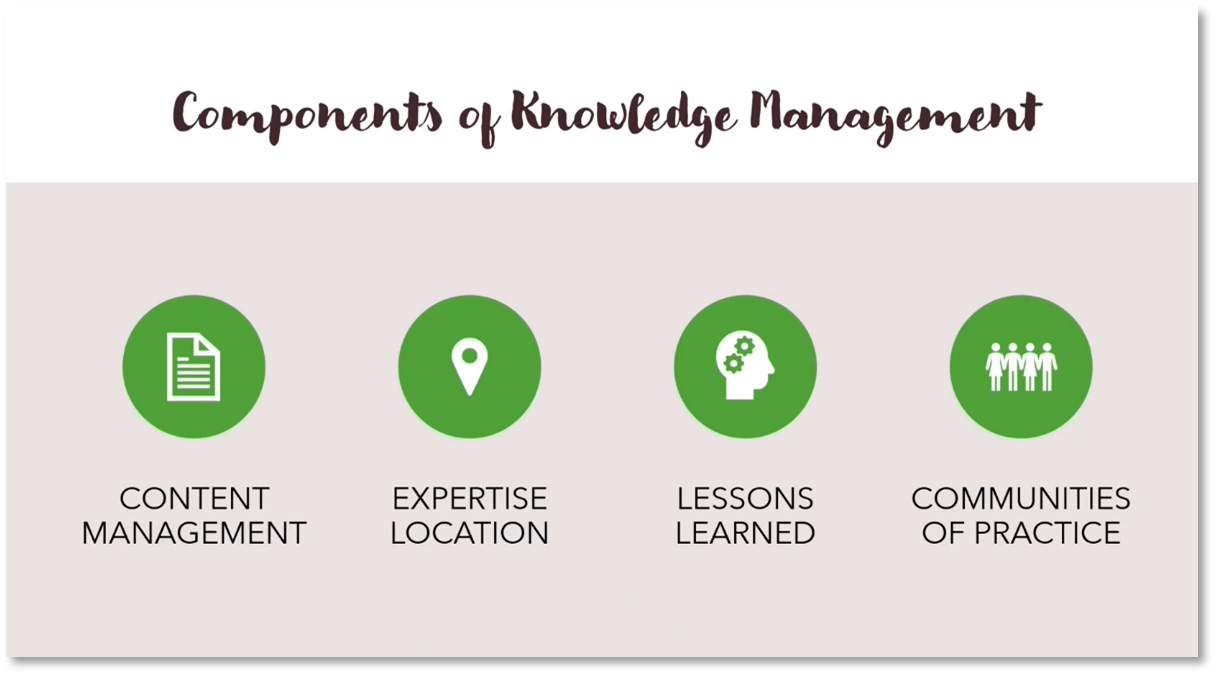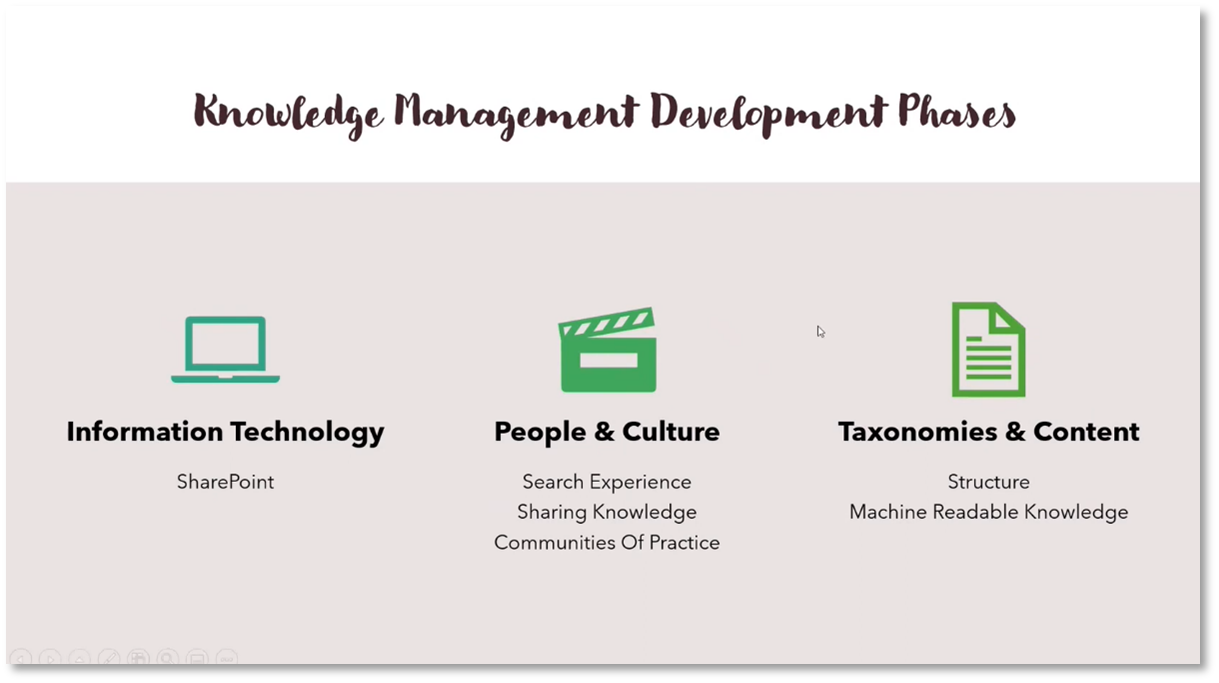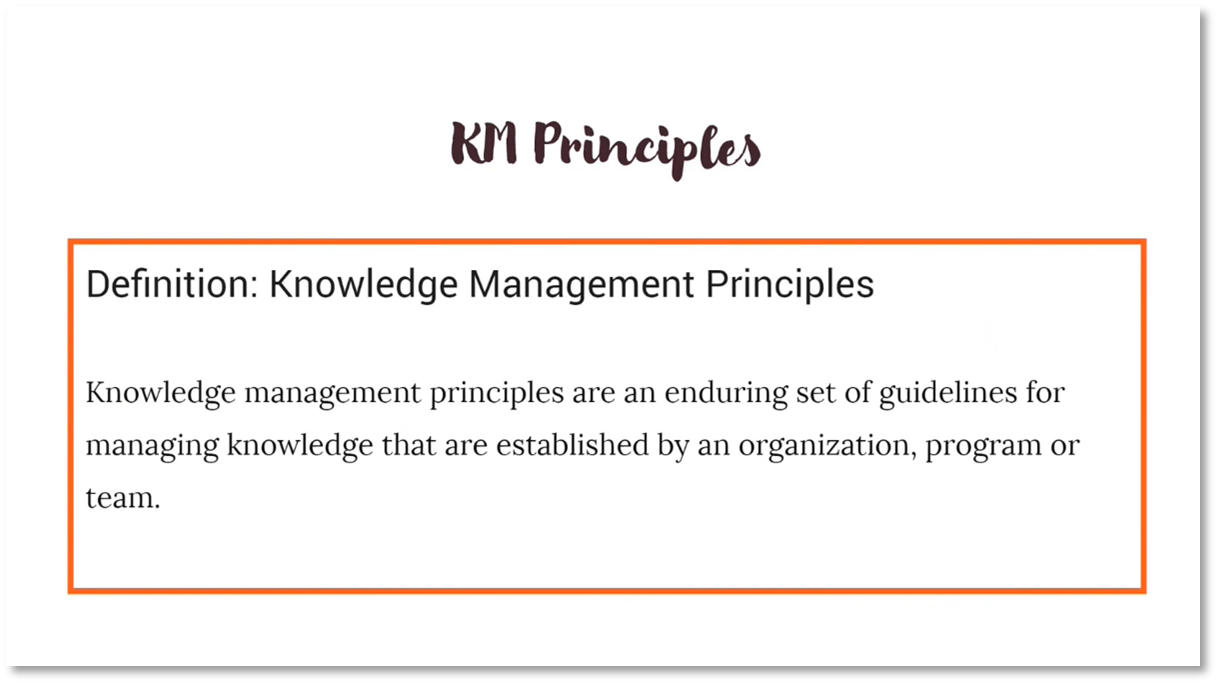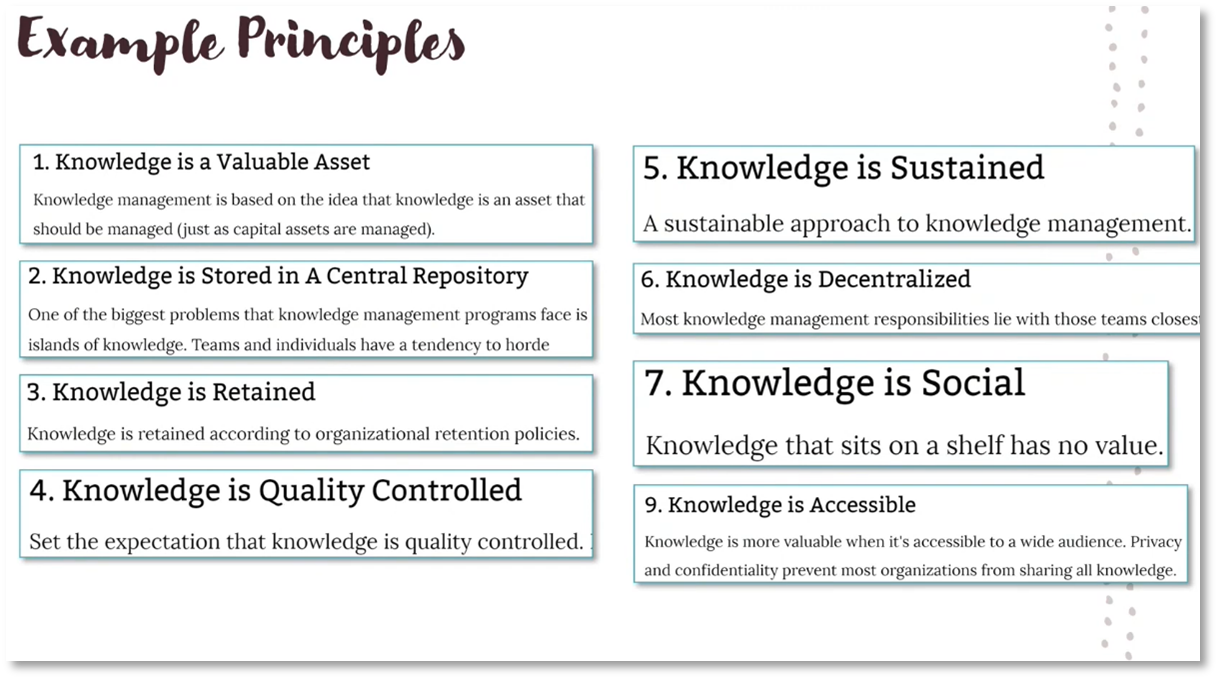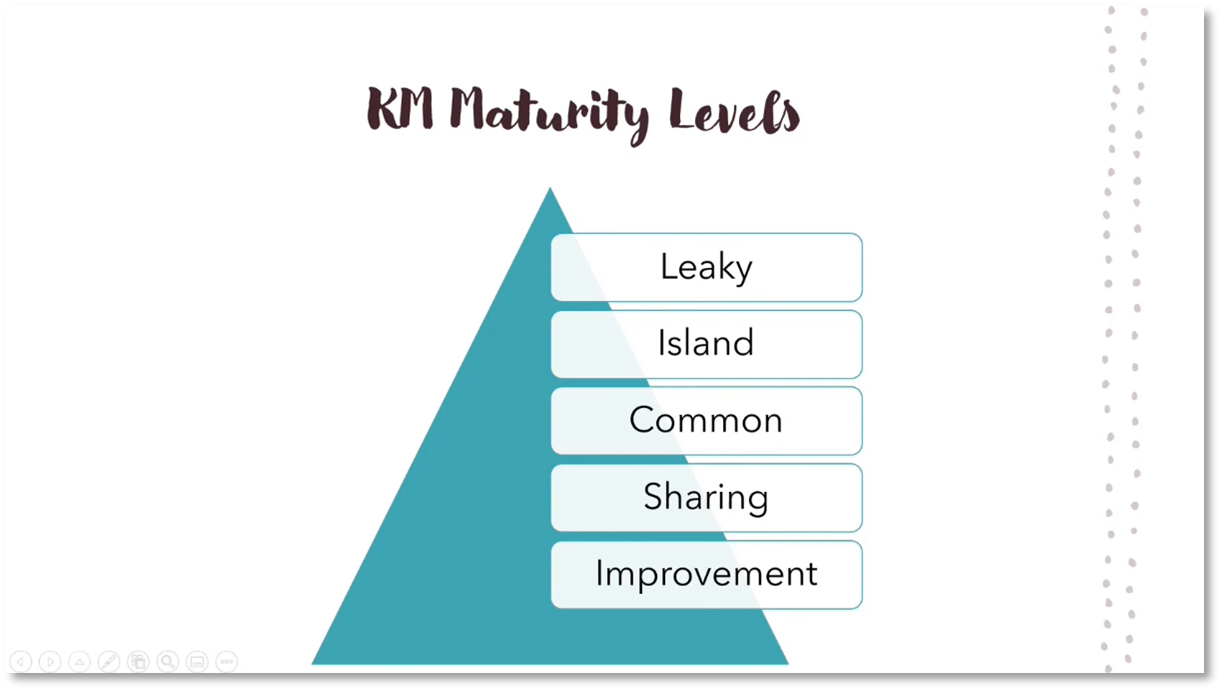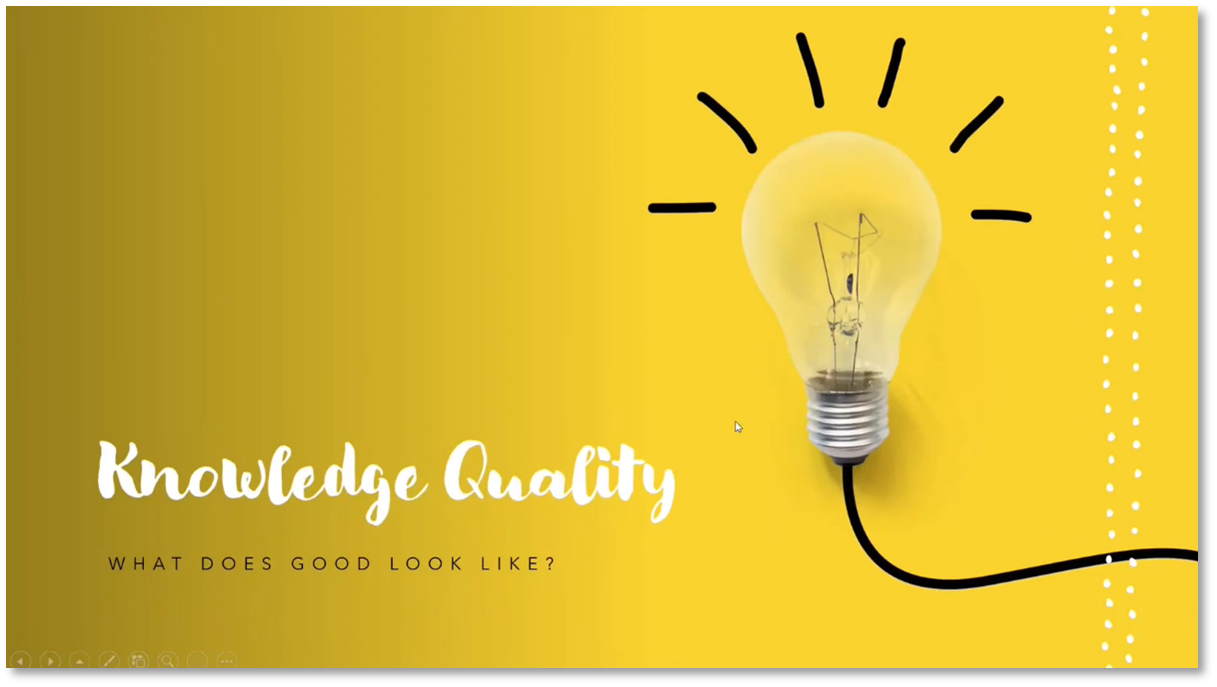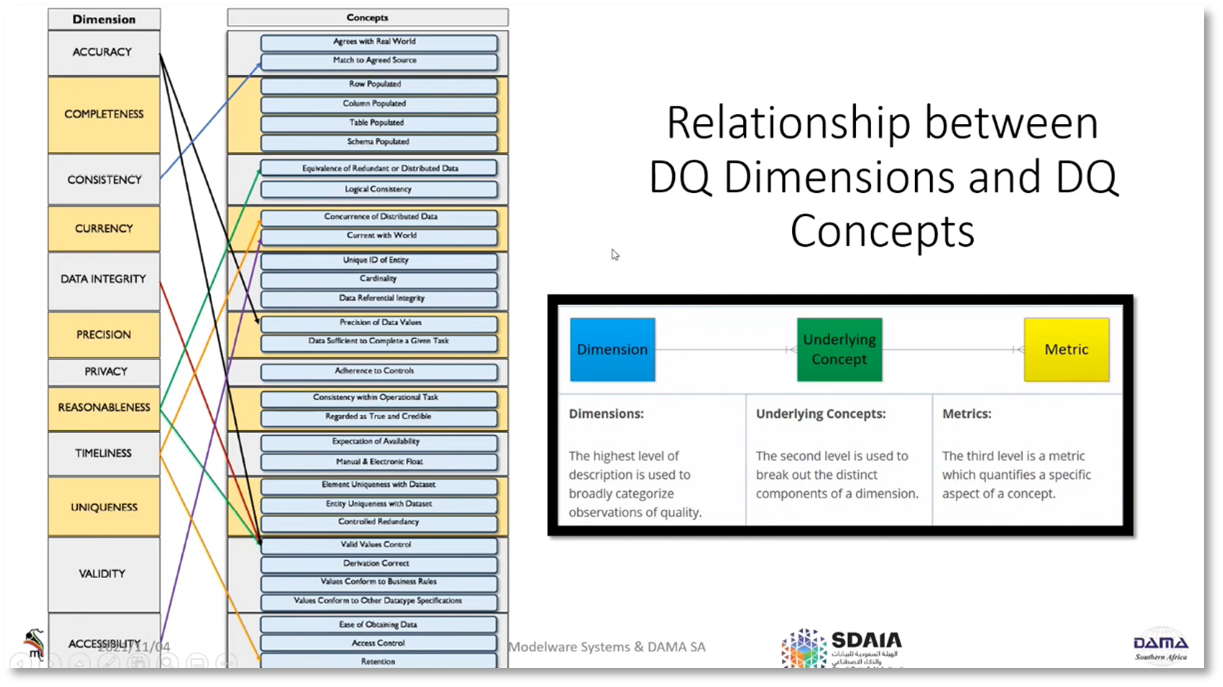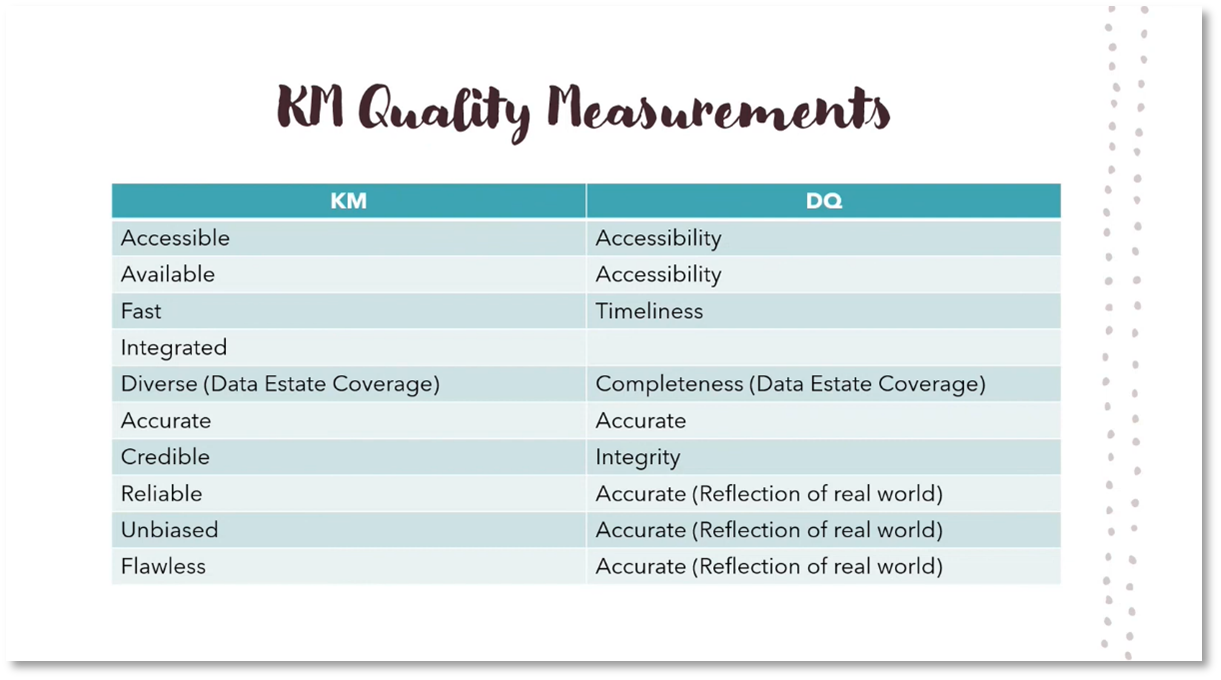Document & Content for Data Executives
Executive Summary
Knowledge management is critical to organisational success, and knowledge graphs are essential. ‘Document & Content for Data Executives’ covers the challenges and importance of knowledge management, including the transfer of implicit knowledge to explicit knowledge, the importance of tacit knowledge, and the role of after-action reports. Howard Diesel discusses the phases of knowledge management, the principles of knowledge management, and the dimensions of knowledge management and data quality measures. The webinar highlights the importance of training and knowledge sharing in data management and the measurement of knowledge management. Howard emphasises the significance of knowledge management in organisational learning and success.
Webinar Details:
Title: Document & Content for Data Executives
Date: 16 November 2021
Presenter: Howard Diesel
Meetup Group: Data Executives
Write-up Author: Howard Diesel
Contents
Executive Summary
Webinar Details
Knowledge Management and Document & Content Management
Challenges and Importance of Knowledge Management
Knowledge Management and HR in Organizations
Definitions and Importance of Knowledge
Knowledge and Intelligence
Knowledge and its Attributes
Challenges of Transferring Implicit Knowledge to Explicit Knowledge
After-Action Reports and Knowledge Management
Knowledge Management and the Importance of Tacit Knowledge
Describing Knowledge Management
Knowledge Management and Organizational Learning
Knowledge Management Phases and Importance
Knowledge Management and Searching for Information
Principles of Knowledge Management
Knowledge Management and Maturity Levels
Dimensions of Knowledge Management and Data Quality Measures
Knowledge Quality Dimensions
Knowledge Management and Culture in Organizations
Importance of Training and Knowledge Sharing in Data Management
Knowledge Management and Measurement
The Importance of Knowledge Management
Knowledge Management and Document & Content Management
Howard discusses the lack of understanding and recognition of knowledge management as an asset within organisations. He sought insights on convincing organisations about the importance of knowledge management and mentioned the need for commitment from stakeholders at the CDO level. While data quality, metadata, and master data are popular topics, knowledge management lacks interest. Howard shares an anecdote of a conference attendee in the early 2000s who got excited about business rules, which he considers linked to knowledge management and corporate memory.
Challenges and Importance of Knowledge Management
Knowledge Management is transforming data into information and then knowledge, which can be used to drive innovation within organisations. However, Knowledge Management often struggles to find a home within organisations, with different departments claiming ownership. To address this, previous organisations have successfully located Knowledge Management within the research department to assist in its implementation.
Knowledge Management and HR in Organizations
Managing knowledge within organisations can be challenging due to its intangible nature, and different departments may have varying priorities. Some suggest that HR should manage the exit and transfer of knowledge in addition to career planning and knowledge growth. Integrating AI and machine learning can help provide valuable insights, while digital twins allow collaboration and good practices. Communities of practice should actively contribute to knowledge management, and leadership is needed to prioritise such initiatives.
Figure 1 What is Knowledge?
Definitions and Importance of Knowledge
Knowledge is the information and abilities acquired through experience and education. The familiarity, awareness, or understanding of something, including facts, skills, or objects, can be attained through various ways, such as perception, reasoning, memory, and education. The goal is to harness and incorporate this knowledge into the data and information we have already gathered. Barry Devlin highlights the importance of knowledge in business and how crucial it is for businesses to utilize it to achieve success.
Knowledge and Intelligence
Intelligence is a multifaceted concept that can be influenced by people's experiences, leading to different perspectives and biases in decision-making. The goal is to align everyone's perception, reasoning, and memory to see things similarly. Intelligence is defined as facts, information, and skills acquired through experience or education. Specialists and data analysts gain experience and education to develop theoretical and practical understanding. Synonyms for knowledge include understanding, comprehension, grasp, and mastery. Intelligence can be converted into data that machines can use. Different areas have different levels of knowledge in the CYNEFIN diagram, ranging from simple cause and effect to complex environments with multiple perspectives. Confirming thinking and establishing cause and effect in complex environments require hypothesis testing and probing. Differentiating experience from information can be illustrated using revenue analytics showing declining sales for a clothing brand.
Figure 2 Knowledge Definition
Figure 3 Information vs Experience
Knowledge and its Attributes
The decline in sales has led to an investigation into the cause, which was concluded by the marketing team as the chief fashion designer's lack of creativity. Knowledge can be categorised as high or low value, with high-value insights providing significant value, such as trends or valuable data. Information that is too personal or trivial may be considered mere information rather than valuable knowledge. There is a distinction between easily transferable knowledge (represented as data) and knowledge that is difficult to transfer person-to-person or represent as data. Tacit knowledge refers to knowledge that is challenging to write down, visualise, or transfer from one person to another.
Figure 4 Other Attributes of Knowledge
Challenges of Transferring Implicit Knowledge to Explicit Knowledge
Implicit knowledge, such as language fluency or innovation skills, cannot be explicitly taught. Learning a language requires immersion in the culture and environment rather than memorising rules. Similarly, innovation is an elusive skill that some are naturally better at. Books cannot fully teach leadership skills, requiring practice and experience. Aesthetic sense is subjective and determines why we find certain art and culture appealing. Selling skills vary among individuals, with some having a natural talent. Finally, transferring tested knowledge to explicit knowledge is the most challenging aspect of knowledge management.
Figure 5 Tacit Knowledge
After-Action Reports and Knowledge Management
An after-action report is a tool used to extract and capture knowledge from a group of people after a contact or venture. Originally a military term, pilots and submarine captains used after-action reports in the Second World War to explain their discoveries and experiences. After-action reports should be used in various activities such as data profiling, building a data strategy, and sprint orders. The knowledge manager is a skilled individual who extracts and commits the knowledge into a knowledge management system. The lack of a knowledge manager in projects often leads to repeated mistakes and failure to capture lessons learned. The responsibility of a knowledge manager is to debrief, filter the noise, create a report, and disseminate the lessons learned. Recording improvements and quirks and debriefing with superiors helps in continuous improvement and learning application. After-action reports are a valuable tool for capturing lessons learned and improving processes in both military and civilian contexts.
Figure 6 Implicit Knowledge: "After Action Reports"
Knowledge Management and the Importance of Tacit Knowledge
Learning to bake bread or sourdough through videos can be challenging due to the quick pace and difficulty replicating techniques. Experts may struggle communicating their methods, making recipe-building and knowledge development daunting. Knowledge management is essential to preserve valuable knowledge and support strategic objectives. This practice involves identifying, creating, communicating, socialising, measuring, and improving knowledge, making it part of everyday life. Organisations can transfer tacit knowledge and gain insights by documenting and consolidating information to make informed decisions and take action.
Figure 7 What is Knowledge Management? And which one is right for you
Figure 8 Support Strategic Objectives
Describing Knowledge Management
Knowledge management is an integrated approach to identifying, capturing, evaluating, retrieving, and sharing all enterprise information assets, including databases, documents, policies, procedures, and individual expertise and experience. Despite its importance, it is not commonly referred to in the DM box. Knowledge is an asset that should be shared and distributed within an organisation, and knowledge management aims to create value that leads to business advantage. It helps in avoiding time and money wasted when valuable information is lost due to employee turnover and involves improving processes and preserving corporate memory for new employees to access.
Figure 9 Enterprise Information Asset Management
Figure 10 How-To Create Value that leads to Advantage
Knowledge Management and Organizational Learning
Utilising individuals' intellectual and social capital to enhance an organisation's learning capabilities is knowledge management. One of the biggest challenges is the time it takes for a new person to become a specialist in their work area. On-the-job learning is crucial, but it's also necessary to have a repository of past successes and failures for future reference. The main objective of knowledge management is to derive knowledge from information and make it easily accessible. Building an ontology is one way to catalogue and organise knowledge. Fortuna and Gartner have discussed knowledge management since 1997, emphasising that knowledge has components beyond data and information. Thus, refining and assessing information is vital in the process of knowledge creation and management.
Figure 11 How-To Improve Organisational Learning Capabilities
Figure 12 Derive Knowledge from Information
Knowledge Management Phases and Importance
Knowledge management is a crucial aspect of any organisation. It involves the acquisition and utilisation of both database records and document records. Connecting individuals with expertise is essential for effective knowledge management. Expertise in location plays a vital role in accessing the assistance of knowledgeable individuals when needed. Capturing lessons learned and creating after-action reports are essential components of knowledge management. Communities of practice encourage discussion and sharing of knowledge. Additionally, continually working on and building knowledge management is important. There are different phases of knowledge management, and it can be considered an underlying principle for data and information maturity and organisation. Information technology often serves as the starting point for knowledge management initiatives.
Figure 13 Components of Knowledge Management
Figure 14 Knowledge Management Development Phases
Knowledge Management and Searching for Information
Understanding the search experience and creating communities of practice is critical for efficient knowledge management. To find the necessary information, it is essential to define controlled vocabularies with synonym rings and to use appropriate terminology. Structuring knowledge and providing machine-readable knowledge are also necessary for efficient knowledge management. Machines can help in mining and analysing new content, providing insights, and identifying potential issues or gaps in knowledge. Finally, collaboration, machine learning, and analytics contribute to stronger knowledge sharing and management.
Figure 15 Why do we need to manage knowledge?
Principles of Knowledge Management
Knowledge management principles are a set of guidelines established by an organisation or team to manage knowledge as an asset. These principles serve as a framework to achieve goals in knowledge management and should not require constant reworking. Knowledge is stored in a central repository, posing challenges in finding a common ontology for sharing and contributing knowledge. Retaining knowledge according to the organisational attention period is crucial, as knowledge has a half-life and can become outdated due to advancements in techniques and technologies. Quality control measures must be implemented to ensure knowledge accuracy and reliability.
Figure 16 Knowledge Management Principles
Figure 17 Examples of Knowledge Management Principles
Knowledge Management and Maturity Levels
Quality control and accuracy confirmation are essential in knowledge management and can be achieved through platforms like Wikipedia or Wikileaks. A sustainable approach is required for accessibility and decentralisation of knowledge. Building an ontology for a team and creating micro vocabularies are crucial for effective knowledge management. Knowledge sharing is valuable only if accessible to a broader audience, but privacy and confidentiality can often limit organisations from doing so. Different levels of knowledge management maturity exist, starting from a dysfunctional state to reaching improvement. The ultimate goal is to move from a leaky or island scenario to an improved state of knowledge management.
Figure 18 From Dysfunction to Bliss: Knowledge Management Culture
Figure 19 Knowledge Management Maturity Levels
Dimensions of Knowledge Management and Data Quality Measures
Knowledge management and data quality dimensions include the underlying concept, the main dimension, and the metric that measures it. Measuring knowledge management and data quality is important and requires a focus on accessibility, availability, timeliness, integration, diversity, completeness, accuracy, credibility, reliability, unbiasedness, and flawlessness. Integrated knowledge is the process of connecting knowledge to business processes and providing required information for specific tasks. The dequeue dimension related to integration requires further examination. Diverse refers to the coverage of data across the entire data estate. Flawless knowledge is free of errors and criticism.
Figure 20 What does good look like? Knowledge Quality
Figure 21 Relationship between Data Quality Dimensions and Data Quality Concepts
Figure 22 Knowledge Management Measurements
Knowledge Quality Dimensions
Knowledge is a valuable asset that should be shared and discussed without fear of criticism. Ideas should be freely expressed, and experts should not control individuals. Wisdom is translating knowledge into insight with high value and freshness. The quality of knowledge can be measured in terms of its social velocity and adaptability in different areas. Integrated knowledge combines completeness and integrity, allowing access to all necessary information. Quality should be integrated into every aspect of the knowledge management process, and it is important to avoid reinventing the wheel and instead augment existing knowledge and address areas where there may be shortcomings.
Knowledge Management and Culture in Organizations
Sharing knowledge is crucial for the growth and success of any organisation. Knowledgeable people play a vital role in decision-making, and their expertise needs to be extracted and shared. However, retiring industry experts pose a challenge in retaining their knowledge for the next generation entering the organisation. Successful organisations prioritise knowledge sharing and growth over personal power and focus on the bigger picture by prioritising the organisation, country, and culture over individual needs. Utilising digital tools, such as creating a digital twin, can help capture and transfer knowledge into a machine-readable format, which has become common in various industries. Overall, an organisation's culture plays a significant role in the successful dissemination and retention of knowledge, and influencing and changing an organisation's culture is crucial for successful change management.
Importance of Training and Knowledge Sharing in Data Management
Utilising a digital twin is a promising approach to validate the functionality of a project or process. Businesses can ensure that simulating processes achieve desired data quality profiles through a digital twin. Additionally, the ability to capture and store knowledge and information, similar to platforms like Wikipedia, can be valuable for businesses. Establishing a culture that promotes effective ways of doing things can help prevent pitfalls and reliance on external sources like Google. Building a bridge between departments or teams is crucial to improve workflows and avoid mistakes. Training and knowledge sharing also significantly enhance data literacy and management skills, which can significantly improve overall performance.
Knowledge Management and Measurement
Proper training and knowledge management are crucial for successful data science implementation. Using scorecards in data model ratings may raise questions about the specialists' expertise. Companies tend to choose the path of least resistance, leading to bad practices. The data people gap is a significant challenge, which can be addressed by retaining and managing existing employees' knowledge, as specialised individuals within the organisation are often the best fit for data science roles. The chapter on Monet stresses the importance of showing the value of knowledge management in monetary terms and the challenge of measuring its effectiveness. Therefore, speed and consistency in training individuals to master techniques are critical in achieving organisational goals.
The Importance of Knowledge Management
Knowledge management can provide significant value and benefits to organisations, and it is important to make the value of knowledge visible within the organisation. Though some costs may be associated with implementing and maintaining knowledge management, it can also be seen as an asset and a source of competitive advantage. Linking knowledge management to real business benefits can lead to rewards. Initially, data quality was not considered important, but its significance was recognised when linked to business benefits. Therefore, knowledge management should be seen as a more meaningful concept than just document and content management. However, implementing knowledge management should be approached with care and consideration.
If you want to receive the recording, kindly contact Debbie (social@modelwaresystems.com)
Don’t forget to join our exciting LinkedIn and Meetup data communities not to miss out!


